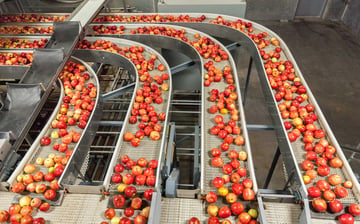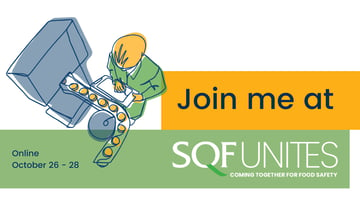FoodLogiQ Product Marketing Manager Kirstin Meyerhoeffer is joined by EFI Data and Impact Manager Lexie DeGrandChamp for a discussion about auditing best practices, shifting to address changes brought on by COVID-19, finding the right combination of auditing formats and successfully deploying internal audits. Listen to the conversation on actionable audits, hear more about FoodLogiQ’s new internal auditing functionality, and learn how to best utilize quality data to uphold food safety and harness trust in your brand.
Whether executed internally, assigned to suppliers or conducted by a third party, audits enable organizations within the food industry to proactively identify and resolve issues while continuously delivering on brand promise.
The Equitable Food Initiative’s Data and Impact Manager Lexie DeGrandchamp knows this firsthand. EFI is a nonprofit certification and skill-building organization that seeks to transform agriculture and improve the lives of farmworkers. The organization brings together growers, farmworkers, retailers and consumers to solve the most pressing issues facing the fresh produce industry. Its unparalleled approach sets standards for labor practices, food safety and pest management, while engaging workers at all levels on the farm to produce Responsibly Grown, Farmworker Assured™ fruits and vegetables.
DeGrandchamp manages data collection and organization from certified farms and participating retail partners, and helps tell the story of EFI’s impact on farms and farmworkers in the Americas. In short, she lives and breathes the troves of auditing data collected across dozens of locations internationally.
The Making of a Successful Audit
“A really good audit,” DeGrandchamp says, “gives you actionable data. it gives you focus, it gives you things to work on – a to-do list – a prioritized list of things. And I also think that a really good audit is collaborative. It involves all levels of your business. Not just the food safety HAACP team, but everyone from the managers, to your HR or compliance folks, to your line supervisors or foremen, to the workers. The workers who drive your tractors, the workers who are janitors, the workers who are working the line or picking your berries. I think that everyone needs to feel involved and included in order to get the best data out, so that you can work on the corrective actions going forward.”
FoodLogiQ’s recent podcast, “Actionable Audits for Enhanced Food Safety,” focuses on the key elements that comprise a successfully designed and executed audit, as well as how audits uphold and expand upon the modern definition of food safety. “Food safety audits [may] happen one day a year, but you're producing, especially in today's global supply chains, that product 365 days a year,” DeGrandchamp elaborates. “And so it's really important that you have a dedication to food safety culture each and every day. And I think that comes from visibility of the food safety team and really empowering people to take ownership of what is in their realm. And identifying: Where does this make the food less safe? And how can we speak up, and how can we fix that problem in a sustainable way?”
Finding the Right Blend
DeGrandchamp also discusses shifts that EFI has made in light of COVID-19, the importance of finding the right hybridity of auditing formats, and how the organization plans to utilize FoodLogiQ’s novel internal auditing functionality moving forward. “When your workers aren't afraid of the audit..then you're just going to get better data and make your products safer,” she says. “And so that's why I love internal audits. I think when they're done genuinely and honestly, they can be a really important tool in your toolbox of continuous food safety. And I personally am trying to rid the world of bad Excel, so I love that it's on the FoodLogiQ platform where everything already lives.”
Listen to the podcast to learn more about the importance of actionable audits, what aspects of a dynamic auditing process lead to effective action, as well as how to apply these elements in your organization’s auditing program. For more information on first, second and third-party audits through FoodLogiQ Connect, get in touch.
Tag(s):
Food Safety
Other posts you might be interested in
View All Posts
8 min read
| March 26, 2021
5 Key Takeaways from the 2021 GFSI Conference
Read More
Trustwell News
6 min read
| December 17, 2021
FoodLogiQ Connect Surpassing 100 Million Critical Tracking Events
Read More
Food Safety
6 min read
| October 29, 2021

